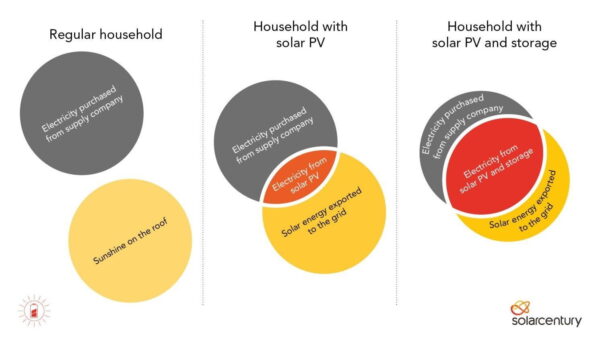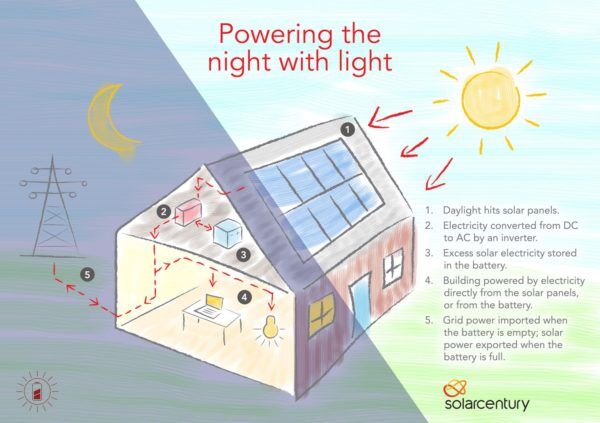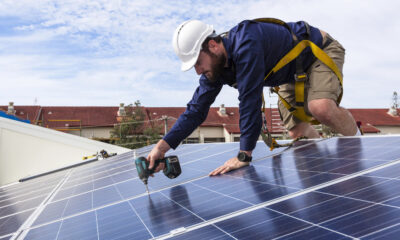

Energy
Your home can be powered by solar around the clock
Storage powers the night with light
In the midst of Brexit and Pokemania, it’s easy to overlook a shift taking place in global energy networks that has far reaching benefits for us all. Solar can now economically provide the majority of a homeowners’ electricity demand thanks to improvements in the performance, lifetime and cost; lithium batteries are 90% cheaper than they were in 1990 and can last longer than 10 years. Welcome to the store-age!
Storage technology has developed so much that in 2015, over a third (41%) of all solar systems installed by German homeowners were tied with battery storage. As noted by analysts at Greentech Media “The future of Germany’s energy storage market is bright, and the solar market will surely benefit as storage prices decline.” The UK will follow Germany’s lead.
Storage cuts the electricity bill
Solar with storage can dramatically reduce a homeowner’s dependence on their supplier for their electricity. We all know that solar panels on your roof generate clean energy; however until recently there has not been a way to guarantee that homeowners can use that energy. A range of new storage devices mean this is no longer the case – a storage device in the home makes the clean energy available whenever you need it- no more timing the washing machine to run during daylight hours.
Most importantly for homeowners, storage means they can consume more of the solar energy generated by their panels. The experience of the UK’s first Tesla Powerwall customer illustrates this well.
After installing the much-hyped battery, the homeowner used a whopping 80% of the electricity generated by the panels on their roof during the last week of April 2016. Previously, the same family – who are not usually at home in the day so demand most electricity in the evening and on weekends – used around 20% of all the solar electricity their panels generated . (This varies from one home to the next depending on a variety of factors such as the size of the storage device).
This diagram shows the sweet spot of the perfect solar and storage marriage. Combining solar and storage reduces the amount of electricity required from a supply company, which translates to hefty savings

Choice
So why is a storage revolution happening now? There are two main reasons: solar and storage prices have hit a tipping point and storage device lifetimes are much longer, so they don’t need replacing as often. Your mobile phone battery might be good for 2 years. The latest good quality lithium batteries for use with solar panels are now warrantied for 10 years.
It’s widely known that the cost of solar PV has fallen dramatically. In fact, earlier this year Oxford University researchers asserted that costs are dropping so fast that solar will continue to decline at 10% per year. This means an average sized 3kWp system costs as little as £5000.
Storage prices have also plummeted by 90% since 1990, and consequently there are now a plethora of new storage devices to choose from. Since the launch of Tesla’s Powerwall last year, a range of storage devices for homes have hit the market from companies like LG, Enphase, Sonnen, SunAmp and Powervault. Consumers have choice, and professional installers select the right product for each householders needs.
Tesla is also not the only vehicle manufacturer in the market to launch a battery device for homeowners; Mercedes, BMW and Nissan are launching batteries for the home which can be charged during the day by solar panels on the roof, ready to offload to an electric vehicle in the evening. With this choice, it’s getting easier for homeowners to find a device that’s right for them.
What’s right for your home?
You could consider:
• What’s my budget?
• If I look at when I use electricity, could I use more of the solar power from my solar roof system if I get an energy storage device?
• How important is it for me to become energy independent i.e. less reliant on my electricity supplier?
Storage in 2016
Analysts IHS predict that the global energy storage market will double this year as homes, businesses and utilities adopt energy storage. “Energy storage is set to grow as fast as solar photovoltaic energy has in recent years,” according to Marianne Boust, an IHS principal analyst.
If these predictions ring true, you could find yourself shopping for a storage system much sooner than you thought.

By Dr Andrew Crossland and Sarah Allison at Solarcentury


 Features11 months ago
Features11 months agoEco-Friendly Cryptocurrencies: Sustainable Investment Choices

 Energy11 months ago
Energy11 months agoThe Growing Role of Solar Panels in Ireland’s Energy Future

 Energy10 months ago
Energy10 months agoGrowth of Solar Power in Dublin: A Sustainable Revolution

 Energy10 months ago
Energy10 months agoRenewable Energy Adoption Can Combat Climate Change
























